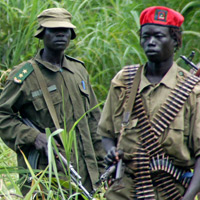
The Juba Peace Talks: Year 1
Background
While there has been some progress on the northern Uganda peace process taking place in Juba, southern Sudan, the situation on the ground remains grim. Even though one thousand Ugandans die each week from malnutrition, violence and disease, humanitarian assistance is being scaled back, LRA atrocities and abductions continue in southern Sudan, and the threat of renewed violence looms over northern Uganda, the Democratic Republic of Congo, and even the Central African Republic. The one year old Juba peace process is the best hope for northern Ugandans, but many remain skeptical that it can succeed without greater U.S. involvement. Since talks resumed on April 26, the parties have signed basic agreements on two agenda items: “comprehensive solutions to the conflict” and “reconciliation and accountability.”
The Situation
While the achievements of the peace talks should not be discounted, they are also shallow, ambiguous, and problematic. Focusing on comprehensive solutions perpetuates the fiction that peace talks in Juba with the LRA are an appropriate forum to deal with the complex issues that northern Uganda faces. Discussing reconciliation and accountability at the talks lays out an array of options to choose from but delays difficult decisions. In both cases, the weak and isolated LRA may be interested in using broad agreements on principles as a cover to buy time, build strength, and gain undue legitimacy by rebranding themselves as representatives of marginalized northern Ugandans.
Moving Forward
The United States has a crucial role to play in helping to create the conditions for peace. The new appointment of a “senior advisor” is a start, but the job must be re-focused, with a clear mandate to support the peace process, and the advisor must be based in Uganda instead of Washington.. The Juba peace process must ensure that the parties confront and work through basic elements of a final agreement. Satisfying the security and livelihood needs of Joseph Kony and his close circle of commanders remains the critical yet unmet challenge of the talks. Ultimately, the United States could provide the peace partner that President Museveni needs, and could give Kony the reassurances he needs that he won’t be hunted as a criminal or terrorist if he signs and implements a peace deal.
To ensure that the peace process doesn’t stretch out for another year, five steps are necessary:
- Conclude the agreement on reconciliation and accountability: A genuine, credible consultation process with victims must be followed rapidly by final negotiations on specific justice mechanisms.
- Deal with the key leaders on the core issues: Addressing the LRA military leadership’s security and livelihood is the neglected heart of this peace process, and is best handled by directly engaging LRA leader Joseph Kony.
- Insert discipline into the Juba process: The LRA’s strategy at the peace talks is to gain strength and options by securing time, space, supplies, and an improved image. Donors and mediators must prevent peace talks from enabling the LRA to stall and rebuild through tight time frames, extensive oversight, and clear financial constraints.
- Develop leverage by devising a fallback regional security strategy: Both a clear carrot and a strong stick are necessary to bring Kony out of the bush, and the current process lacks both a credible backup plan to apprehend the LRA leadership should talks collapse.
- Prepare for a follow-up consultative process in northern Uganda to address long term issues of resettlement, redevelopment, and reconciliation: A broad-based, inclusive forum within northern Uganda, not Juba, is the only way to build a sustainable peace capable of breaking the cycle of conflict that has ensnared the area for 20 years.
The Crucial—and Missing—U.S. Role
The United States remains on the sidelines in the quest for peace in northern Uganda. In order for peace to have a chance in northern Uganda, this must change. The United States can be influential by:
- Contributing to direct talks between President Museveni and Kony over security and livelihoods by providing a real negotiating partner for the president and allaying Kony’s fears that the United States will hunt him even if he signs a peace deal because he remains on a U.S. terrorist list;
- Supporting efforts to develop a Plan B military strategy for apprehending the ICC suspects should the LRA leave the peace talks;
- Resourcing Disarmament, Demobilization, and Reintegration (DDR) strategies designed to support reintegration of rank and file LRA excombatants;
- Working in the UN Security Council to squeeze off sources of support for the LRA internationally through strengthening the Sanctions Committee.

